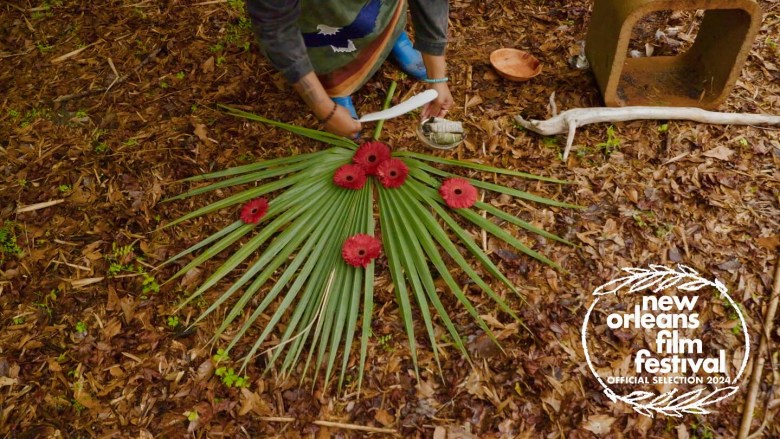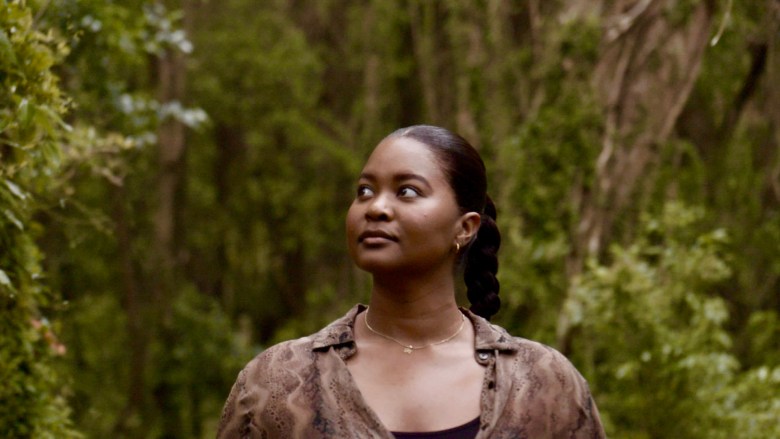Since pre-colonial times, the Atakapa-Ishak Nation lived, migrated, nurtured nature, and exchanged throughout the Gulf Coast. The tribe’s traditional lands stretched from Harris County in Texas to Pointe Coupee Parish in Louisiana. Today, many descendants live throughout the states of Louisiana and Texas.
In addition, Louisiana retains vibrant Indigenous influences. Visible in town and street names like Opelousas and Tchoupitoulas, as well as in cuisines such as gumbo filé and tasso, which reflect Native culinary practices.
Americans often forget that Louisiana’s First People endured enslavement, forced miscegenation, land theft, brutal attempts of genocide, and much more.
“Code Noir [were] laws that were specifically meant to govern African slaves, people of African descent, Indigenous People, Free People of Color, Mulattoes, Creoles [and] melanated people,” said Shawn Papillion (Atakapa-Ishak Nation’s Yukití Ipshok/Medicine Person) in ISHAK, the tribe’s first documentary.
To this day, the state and federal governments fail to provide land restoration, recognition, and reparations to Native tribes.
Atakapa-Ishak Nation documentary
Maaliyah Papillion, an Atakapa-Ishak Nation tribal member from Tew Tul (Tail of the Lake, aka Lake Charles, Louisiana) is next in line as Chief of the Tribe.
This will make her the second woman to lead since 1771. As an Afro-Indigenous Louisiana Creole, Papillion is proud of her multicultural heritage.
Her “inner-standing”, ancestral ties, and love for the elements of nature, specifically land, and water, are immensely immersive throughout her work.
Directed and narrated by Papillion, and produced by Drake LeBlanc, “ISHAK” is a powerful and intimate short film that calls for action to honor Indigenous sovereignty and protect Louisiana’s wetlands and coastal region. These factors are vital to the cultural and ecological survival of communities like the Atakapa-Ishak Nation.

In the film, Papillion states that her tribe can not “continue to wait” for the government to give them the resources they need, especially in the wake of climate change.
The Black Wall Street Times interviewed Papillion about “ISHAK,” the importance of valuing one’s identity, and Southwest Louisiana’s climate crisis.
Q&A with Atakapa-Ishak descendant Maaliyah Papillion

The Black Wall Street Times: Please share about your multicultural heritage, traditions, and upbringing.
Papillion: As an Afro-Indigenous and Creole woman from Southern Louisiana, I grew up acutely aware of how society often overlooks or misrepresents people like me. My race and identity have long been questioned, with others deciding that I didn’t fit the typical mold of what a Black or Native American person “should” look like. This experience of being “in between” has defined much of my journey. Art has become my refuge—a space where I can express myself freely, without judgment or needing to conform.
My role as a storyteller, culture bearer, artist and future chief of the Atakapa-Ishak tribe has deepened my commitment to representing those marginalized or forgotten by society. My work seeks to bring visibility to Afro-Indigenous narratives that are often left out of the media, while challenging stereotypes that keep us confined to narrow definitions.
I believe storytelling is a powerful gateway to understanding and healing. My films focus on themes of identity, cultural erasure and preservation, and social justice, while inviting audiences into complex, nuanced conversations about who we are and how we exist in this world.
My latest film “Ishak”, focuses on communal healing and cultural reclamation while telling the story of the Atakapa-Ishak, the tribe in which I descended from. This film, like much of my work, is a call to action for future generations to embrace their identities unapologetically and to build communities rooted in love, resilience, and self-determination.
Through my art, I hope to spark conversations that heal, deepen empathy, and celebrate the strength found in our shared humanity. Each story I tell is a step toward envisioning a future where Afro-Indigenous voices are not only heard but celebrated and uplifted. My work also seeks to honor and illuminate the powerful allyship between Black and Indigenous communities—a shared history of resilience and solidarity that is too often erased in mainstream media and contemporary history books.
Sovereignty for Afro-Indigenous people
The Black Wall Street Times: Due to the antiquated blood quantum rule many tribes, including the Atakapa-Ishak Nation, face challenges when it comes to state and federal recognition. What would you like to say to the state and federal government including the Bureau of Indian Affairs on this discriminatory matter? What advice would you give them to smoothen and quicken the process?
Papillion: The federal government must acknowledge that Louisiana was built on the backs of enslaved African and Indigenous peoples, whose forced coexistence led to the rich cultural blending that gave rise to Afro-Indigenous communities. These historical injustices, orchestrated by the government, have been ignored, rewritten, and erased through mechanisms like the Code Noir and blood quantum policies, which obscure the origins and legitimacy of Afro-Indigenous peoples.
To address this erasure, the Bureau of Indian Affairs (BIA) must seek guidance from qualified historians and linguists familiar with the region’s complex history as they evaluate cases for federal recognition. The current process is marred by a lack of understanding and a reliance on outdated, discriminatory frameworks like blood quantum, which disproportionately harm tribes such as the Atakapa-Ishak Nation.
Modern Indigeneity is not a one-size-fits-all construct, particularly in regions like the South, where slavery has deeply shaped cultural identities. Granting sovereignty to Afro-Indigenous communities is a vital step toward addressing the enduring impacts of colonization and recognizing the diverse realities of Native and Black communities. The BIA must take informed, nuanced approaches to ensure equitable and timely recognition for these marginalized groups.
Environmental injustices
The Black Wall Street Times: What environmental injustices has the Atakapa-Ishak Nation dealt with or are currently dealing with? And from a holistic standpoint, how do these injustices affect nature, including human nature?
Papillion: Although the traditional territory of the Ishak spans over 14 parishes in Louisiana, we currently own none of this land. This is a reality faced by many tribes across the country, stemming from the lack of treaties with the U.S. government and policies like the Allotment Era, which stripped Indigenous peoples of their land. The loss of land access deeply impacts human well-being by increasing food insecurity and severing our connection to the land, a connection essential to cultural identity and sustainability.
It also has devastating effects on nature. Indigenous people, while comprising only 5% of the world’s population, are responsible for stewarding 80% of its natural environment. When traditional land stewards are displaced, everyone is put at risk.
Louisiana’s crisis of rapid land erosion, among the highest in the country, is a direct result of colonization, the Industrial Revolution, the dominance of oil and chemical industries in the Gulf region, and unchecked land acquisition for profit-driven enterprises—issues that were unheard of before these exploitative practices began.
Becoming the next Chief of Atakapa-Ishak Nation
The Black Wall Street Times: As the next Chief in line describe your current state of existence. How have you been holistically preparing yourself for what is and what’s to come?
Papillion: For the past two years, I have been learning our native language, Ishakkoy, while gaining invaluable cultural preservation and traditional knowledge from our current Chief and Deputy Chief. In December, I will graduate from the University of Oklahoma with a master’s degree in Indigenous People’s Law.
This combination of formal education and traditional teachings equips me to honor and carry forward our tribe’s traditions while advocating for our people in innovative and impactful ways.
The Black Wall Street Times: How did the opportunity to showcase “ISHAK” come about for Southern Screen?
Papillion: Julie and the entire Southern Screen team welcomed us with open arms and prioritized working with our community to educate their audience on the history of the land in which the film festival took place.
We are so grateful for their partnership and commitment to work with the original inhabitants of the area to create a stronger environment for everyone to come.
“ISHAK”, the documentary
The Black Wall Street Times: What messages and intentional call of action would you like for Gulf Coast Creoles, Cajuns, and Americans nationwide to take after watching “ISHAK” and in general?
Papillion: ISHAK is a call to action for everyone to take better care of their neighbors, no matter where they are. While we cannot undo the past, we have the power to shape a better future together. This film urges Gulf Coast Creoles, Cajuns, and Americans across the nation to support Indigenous-led grassroots movements focused on climate change mitigation and cultural preservation.
By standing with these efforts, we can protect the environment, honor the cultures that have stewarded it for generations, and build a more sustainable and compassionate future for all.



Leave a comment